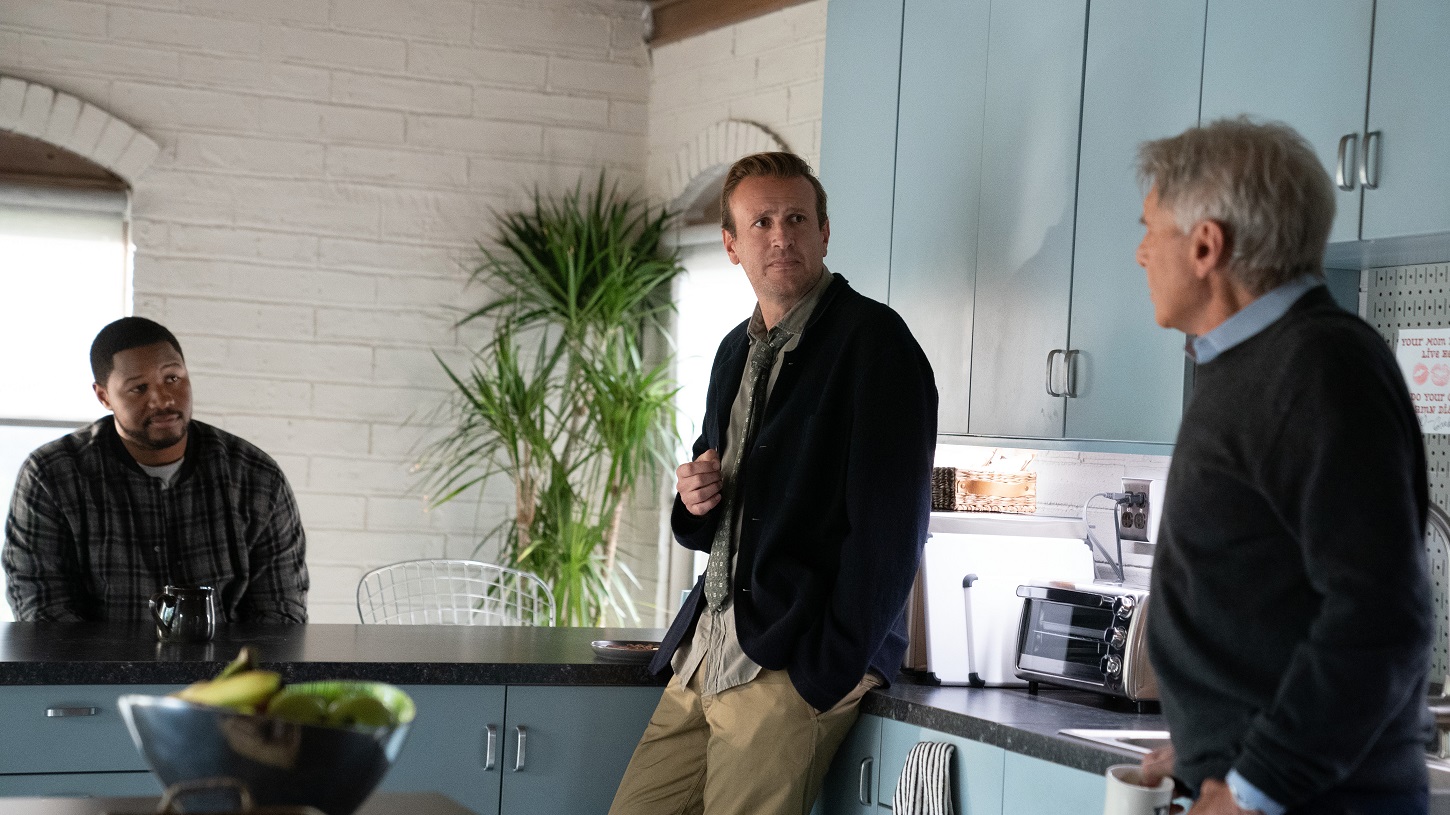Real Takes on Shrinking

Subscribe to Catalyst
Subscribe to get our magazine delivered right to your inbox
Related Articles
Subscribe to Catalyst
Subscribe to get our magazine delivered right to your inbox
Related Articles
We ask practitioners for a reality check on the TV series about therapy, grief, and getting by.
With season one of the popular series wrapping soon, we’ve been following along as the main character Jimmy (Jason Segel) — in all his human fallibility — crosses boundaries with his clients, tries to process his grief, and leans on his fellow therapists, Gaby (Jessica Williams) and Paul (Harrison Ford), as they stumble through life’s ups, downs, and sideways trajectories. How does it end? Is everyone fully self-actualized? Does this kind of stuff happen in real life? We surveyed a few experts to get their take.
The three principal characters often debrief with each other after managing challenging client situations — a kind of rapport-building that happens in many workplaces. In this instance, it seems like the therapists have therapists. Is this a regular dynamic?
In short, absolutely. As a consultant, being in community is necessary to the human healing process.
A lot of therapists have naturally been drawn to this work because, just like our clients, we too are actively riding the ebbs and flows of the human experience: the joys and the pains. Part of what serves the authenticity of the therapeutic relationship is your therapist’s ability to hold space for all of you — both the pleasant and unpleasant experiences.
The truth is, it’s very difficult to hold space and support clients in compassionately witnessing their emotional injuries if we haven’t been willing to do the same for ourselves. This must be an embodied practice, a lifestyle that encourages our clients to show up for themselves while we actively engage in practices that also support us as practitioners. Doing that helps us develop and strengthen our emotional boundaries and promote safety, so that by taking care of our “stuff” it doesn’t interrupt or intrude on our client’s process.
This dynamic was often shown in different scenes with Jimmy, who “presented” as frustrated with his client’s pace of change. As the show progresses, we learn that he has been “numbing” (or shutting down) his emotions since the loss of his wife while struggling to connect with his grief.

Sara Smith is a registered psychotherapist with the Live Free Black Therapist Collective.
As a therapist, having a space where you are supported in seeing the most vulnerable parts of yourself allows you to show up for your clients as a human with lived experience who is ready and willing to walk alongside them on their healing journey.
I regularly access support from my peers and connect with my own therapist. An accessible connection with other colleagues while supporting clients who face challenges is integral to how we as therapists compassionately care for ourselves and others, including other therapists. When Jimmy lost his connection to Paul after a conflict, he really struggled.
In truth, I think this is a metaphor for life. We need each other, and we thrive when we have access to deep and meaningful connections with others where we can be seen, heard, and accepted. Viewing these interactions on screen was an important reminder of that.
Sara Smith is a registered psychotherapist with the Live Free Black Therapist Collective based in Toronto. She specializes in supporting adults in working through the far-reaching impacts of trauma on the mind and body. Sara’s approach is rooted in building embodied awareness, education, empowerment, and validating your experiences while working together to develop effective coping strategies to support your healing journey.
Those are nice offices with Architectural Digest-level ambitions and calming neutral tones. Are your offices that nice? What makes for a good therapeutic environment?
The offices that are depicted in Shrinking are very spacious and nicely decorated in neutral colours. The style they show is one school of thought for therapy offices: a blank canvas that leaves space for the client to think and imagine.
It is similar to the therapy offices shown in The Falcon and Winter Soldier, which is supposed to be a neutral space where the hand of the therapist is not seen at all. The goal of this style is to not reveal anything about the therapist to the client. In this case, the therapist is supposed to be a neutral party, almost not a person in the eyes of the client — they are a therapist, not a person in their own right.
While plenty of therapists follow such design choices — and might even go so far as to take off personal jewelry, such as a wedding ring or a “Best Dad” tie clip — others do the opposite. These therapists choose to show their style in how they decorate. They might stick up posters of favourite movies or show off collectible items. The idea here is to be a human to your clients and be on a journey with them.
This is the decor style I personally use. My goal is to have my clients know a bit about who I am when they look around the office and to start considering whether they’ll get along with me.
It will be interesting to see if Jimmy starts to change up the decor of his office to reflect his more open approach with his clients. Paul is very stoic and distant from those he works with, and keeping out personal elements makes sense for him. Gaby seems to be in the middle. Her overall office decor is quite neutral, although she has several personal touches that make it more hers than what we find with either Paul or Jimmy. Perhaps these changes will be shown in season two.
Dr. Megan Connell is a board-certified licenced psychologist, practising virtually in more than twenty states. She lives in Charlotte, North Carolina, is an avid geek and gamer, and is passionate about teaching others how to use role-playing games such as Dungeons & Dragons in therapy. Watch for her forthcoming book: Tabletop Role-Playing Therapy: A Guide for the Clinician Game Master (Norton, March 2023).
Compassion fatigue seems to be a through-line for each story. How do you manage this in your own life?
The show highlights our humanness and how we tend to put therapists on the “all knowing” pedestal. I remain aware that I am human, too. I’m not a guru and, with humility, I’m mindful of my own tendencies toward self-proclaimed pedestals. I guide as best I can and (frequently) remind myself that I can’t control the outcomes.
I have my own team of professionals and friends that I can debrief with and be in care of my own mental, physical, and emotional health. I’m also in tune with the times I need support, and I’m careful not to judge myself for sometimes feeling less-than. On the show, we witness Paul’s challenges in accepting support from his daughter, and this reminds us that sometimes the helper needs the help.
Boundaries are key, and we see this with Paul many times. When he says he’s not going to do something, there is no waffling or justifying. He knows his limits and honours them.
I have my own go-to’s when I find myself feeling overwhelmed, including routines. Like Liz (played by Christa Miller), who collects and polishes stones as a form of meditation, I blast calming music in my house and stare out the window at the beauty of nature, and this helps ground me. In the shower, I will visualize all the thoughts that don’t serve me going down the drain as the water runs off my body.
Choosing to eat what I like to call feel-good foods is another — blueberries are a favourite. They nurture my health (body and mind) and are full of vitamin C to help with stress.
Having a good laugh, even at myself — not taking myself so seriously — and letting my hair down puts things in perspective and reminds me of the beauty of what we call life.
Author: Yvette Murray lives in Tiny Beaches on Georgian Bay, which she considers her sanctuary. She believes that being surrounded by nature does wonders for her mental health. Yvette is the author of The Mental Health Contagion: Navigating Yourself Through a Loved One’s Mental Well-Being Decline (forthcoming). She is a mental health advocate, influencer, and keynote speaker; a psychotherapist; and a facilitator for the MHCC’s Mental Health First Aid (MHFA) virtual certification program. MHFA is available for those who are supporting adults, youth, and/or older adults. It trains participants on how to recognize a loved one’s mental health problem, have that conversation, and get the best help.
Inset: Sara Smith is a registered psychotherapist with the Live Free Black Therapist Collective.




